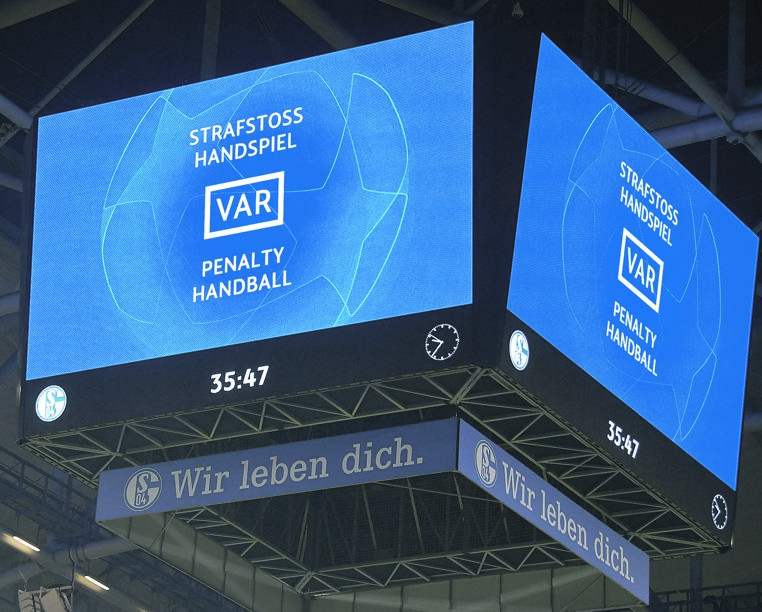
The first leg of the Uefa Champions League last 16 is done and dusted, but what got tongues wagging was the first-time use of the video assistant referee (VAR) system in Europe’s most prestigious tournament.
In three major European cities, VAR was executed with precision, attention to detail and efficiency.
The fourth, which hosted arguably the week’s best game, saw Schalke welcome Manchester City, who allayed any fears that they had lost their champions’ mentality as they came back from a goal down away from home – despite two VAR penalty interventions that did not go their away.
The incidents were so heinous that they required an official statement from Uefa. So horrifying were they that it was not deemed worthy of a Twitter thread, like the first major VAR decision in the Champions League a week earlier in Amsterdam.
The statement read as follows: “Both instances occurred during a period of approximately 10 minutes, in which a technical issue experienced by the VAR technical supplier impacted the ability to deliver replay images to the pitchside referee review area.”
The statement goes on to refer to the need to observe protocol and principle with regard to VAR. It then describes the incidents and notes why they were – despite what the rest of us thought – in fact, correct.
Well, that’s what City’s manager, Pep Guardiola, thought, after he publicly declared his support for VAR, saying he was not aggrieved because the referees were right in applying the law as they saw fit.
There are rumours suggesting that the first penalty incident, marred by the in-field monitors not working – and thus forcing the on-field referee to have the replay described to him by the VAR – was not legal because of the decision having been made for the referee.
Not true: the on-field referee only took the advice of the VAR and then made his own decision, which is final. The laws also allow him not to physically view the incident himself if he so wishes or if the technology does not allow him to.
A video assistant referee (VAR) is a match official with independent access to match footage who may assist the referee only in the event of a “clear and obvious error” or “serious missed incident” in relation to:
a. Goal/no goal;
b. Penalty/no penalty;
c. Direct red card; and
d. Mistaken identity.
- The referee must always make a decision.
- The final decision is always made by the referee.
- There is no time limit for the review process.
- The referee must remain “visible” during the review process to ensure transparency.
All the VAR rules, protocols and procedures can be found here: VAR Rules
But it is not the laws of the game or the protocol that we have a problem with it; it is the failure to show transparency for an innovation that is supposed to make the game fair, or at least as fair as possible.
Unfortunately, that social media explanation last week was the first and last mention of VAR on the Champions League’s Twitter feed over the past two weeks. With just one review article of VAR incidents during that first week, released by Uefa, along with the above official technical statement, the VAR appears to still be largely seen as not transparent and destroying the essence of the game, whatever that means.
These two critiques are not without merit. Many people feel that certain teams are treated differently when it comes to the use of VAR. Without clear, transpicuous communication VAR will continue to be on the back foot. The laws that govern VAR seem fair and look good on paper, but implementing them in a particular scenario can be subject to the on-field referee’s interpretation. That referee, after all, should be the only person to make a decision before and after the VAR intervenes.
Take that first VAR incident in the Champions League: If the referee and the VAR’s conversation were made public in real time, there would be no need for an explanatory tweet which followed. It just looked tacky, as if pandered for mass approval. And people in the stadium, from fans to players and everyone in between, would be less aggrieved had they known what was going on in real time instead of just a quick “VAR: no goal” official proclamation.
VAR in the UCL: in the 38th minute of the Ajax v Madrid first leg, Nicolás Tagliafico’s headed goal was ruled out following a VAR review. The referee identified that Tagliafico’s team-mate Dušan Tadic was in an offside position and interfering with the goalkeeper - pic.twitter.com/sPtZFd6YiB
— UEFA Champions League (@ChampionsLeague) February 13, 2019
Even in a case where technical difficulties are experienced, like in the Schalke penalty incident, if the voice of the VAR official was played over the stadium’s speakers, at least we would be able to hear the description of the review and why the final decision to give a penalty occurred. Doing so could have avoided the long delay that occurred in dealing with the review.
Another option to improve transparency, which occurs in some sports, is to replay the reviewable scenes on the stadium’s big screen. That way, everyone knows what incident is being reviewed, why, and what law is being applied by the ref.
As for the argument that it destroys the essence of the game, one could say that VAR forces players to be better as there is not much leeway to err, thus driving them to improve the quality of football played. Isn’t that what we all want: beautiful football?
And if it’s the emotion and nonstop action you seek in this so-called essence of the game, principle one of VAR may help you: “The aim of VARs is not to achieve 100% accuracy for all decisions, as there is no desire to destroy the essential flow and emotions of football, which result from the game’s almost nonstop action and the general absence of lengthy stoppages.”
But if it’s controversy, talk and analysis that highlights your essence of football, then in all respects VAR has provided you with that.
It bears noting that VAR is in its infancy and many more incidents will occur that are not covered or fully clarified by current laws. But to be fair, even our Constitution – hailed as the most progressive in world – has had amendments made to it.
No matter which team you favour or loathe, and no matter on which side of the VAR coin you sit, the one thing we can all agree on is the lack of trust from all of football’s governing bodies.
Having said that, the first-leg games did not inspire confidence in this latest football innovation. This can be attributed in part to the plethora of unforeseen circumstances that occurred and will continue to occur. Luckily, the rules are still under review, and who knows, we may get a VAR – very aggressive rule – change soon.




 Publications
Publications
 Partners
Partners








